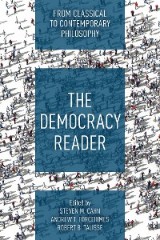Details

The Democracy Reader
From Classical to Contemporary Philosophy|
36,99 € |
|
| Verlag: | Rowman & Littlefield Publishers |
| Format: | |
| Veröffentl.: | 13.07.2021 |
| ISBN/EAN: | 9781538157565 |
| Sprache: | englisch |
| Anzahl Seiten: | 432 |
DRM-geschütztes eBook, Sie benötigen z.B. Adobe Digital Editions und eine Adobe ID zum Lesen.
Beschreibungen
<p><span>Democracies put political power in the hands of the people. But why should people have a say in the operations of the states that govern them? Are democratic states preferable to non-democratic states? If so, is there something intrinsically good about democracy, or does it merely serve an instrumental role? By what procedures should citizens’ votes be counted? How do we keep the voices of the ignorant from drowning out those of the wise? These, as well as other related questions, are explored in this timely anthology of</span><span> forty historical and contemporary readings. </span></p>
<p><span>Short introductions preceding each reading and a general introduction increase student comprehension across the spectrum of readings. With each reading edited for length and accessibility, this volume is ideal for both the undergraduate and graduate students in political theory and philosophy courses.</span></p>
<p></p>
<p><span>Short introductions preceding each reading and a general introduction increase student comprehension across the spectrum of readings. With each reading edited for length and accessibility, this volume is ideal for both the undergraduate and graduate students in political theory and philosophy courses.</span></p>
<p></p>
<p><span>This timely anthology gathers forty historical and contemporary readings edited for accessibility. Short introductions precede each reading and a general introduction increase student comprehension across the spectrum of readings. The volume is ideal for all levels of students in civics, political theory, and philosophy courses.</span></p>
<p><span>Preface</span></p>
<p><span>Introduction by Robert B. Talisse</span></p>
<p><span>PART ONE: CLASSIC SOURCES</span></p>
<ol start="1">
<li><span>Pericles: </span><span>Funeral Oration</span></li>
<li><span>Plato: </span><span>Crito</span></li>
<li><span>Plato: </span><span>Republic</span></li>
<li><span>Aristotle: </span><span>Politics</span></li>
<li><span>Mencius: </span><span>The Works of Mencius</span></li>
<li><span>Niccolò Machiavelli: </span><span>Discourses</span></li>
<li><span>Thomas Hobbes: </span><span>Leviathan</span></li>
<li><span>Baruch Spinoza: </span><span>Theologico-Political Treatise</span></li>
<li><span>John Locke: </span><span>Second Treatise of Government</span></li>
<li><span> John Locke: </span><span>Letter Concerning Toleration</span></li>
<li><span> Jean-Jacques Rousseau: </span><span>Of the Social Contract</span></li>
<li><span> Edmund Burke: </span><span>Speech to the Electors of Bristol</span></li>
<li><span>The Declaration of Independence</span></li>
<li><span>The Constitution of the United States</span></li>
<li><span> </span><span>Alexander Hamilton and James Madison</span><span>: The Federalist Papers #10, #51, and #70</span></li>
<li><span>The Declaration of the Rights of Man and of the Citizen</span></li>
<li><span>Alexis De Tocqueville:</span><span> Democracy in America</span></li>
<li><span>Karl Marx: </span><span>Economic and Philosophic Manuscripts of 1844</span></li>
<li><span>Frederick Douglass: </span><span>What to the Slave Is the Fourth of July?</span></li>
<li><span>Abraham Lincoln: </span><span>Gettysburg Address</span></li>
<li><span>Abraham Lincoln: </span><span>Second Inaugural Address</span></li>
<li><span>John Stuart Mill: </span><span>On Liberty</span></li>
<li><span>John Stuart Mill: </span><span>Considerations on Representative Government</span></li>
<li><span>Elizabeth Cady Stanton: </span><span>The Solitude of Self</span></li>
<li><span>W. E. B. Dubois: </span><span>Of the Ruling of Men</span></li>
<li><span>John Dewey: </span><span>Democracy</span></li>
<li><span>John Rawls: </span><span>The Idea of Public Reason Revisited</span></li>
</ol>
<p><span>PART TWO: CONTEMPORARY ISSUES</span></p>
<p><span>A. Justification</span></p>
<p></p>
<ol start="28">
<li><span>Richard Arneson: </span><span>Democracy is Not Intrinsically Just</span></li>
<li><span>Elizabeth Anderson: </span><span>Democracy: Instrumental Vs. Non-Instrumental Value</span></li>
</ol>
<p><span>B. Deliberation</span></p>
<ol start="30">
<li><span>Seyla Benhabib: </span><span>Toward a Deliberative Model of Democratic Legitimacy</span></li>
<li><span>David Estlund: </span><span>The Epistemic Dimension of Democratic Authority</span></li>
</ol>
<p><span>C. Voting </span></p>
<ol start="32">
<li><span>Jason Brennan: </span><span>Polluting The Polls: When Citizens Should Not Vote</span></li>
<li><span>Julia Maskivker: </span><span>Being a Good Samaritan Requires You to Vote</span></li>
</ol>
<p><span>D. Challenges</span></p>
<ol start="34">
<li><span>Iris Marion Young: </span><span>Activist Challenges to Deliberative Democracy</span></li>
<li><span>Robert B. Talisse: </span><span>Polarization and Democratic Citizenship</span></li>
</ol>
<p><span>Introduction by Robert B. Talisse</span></p>
<p><span>PART ONE: CLASSIC SOURCES</span></p>
<ol start="1">
<li><span>Pericles: </span><span>Funeral Oration</span></li>
<li><span>Plato: </span><span>Crito</span></li>
<li><span>Plato: </span><span>Republic</span></li>
<li><span>Aristotle: </span><span>Politics</span></li>
<li><span>Mencius: </span><span>The Works of Mencius</span></li>
<li><span>Niccolò Machiavelli: </span><span>Discourses</span></li>
<li><span>Thomas Hobbes: </span><span>Leviathan</span></li>
<li><span>Baruch Spinoza: </span><span>Theologico-Political Treatise</span></li>
<li><span>John Locke: </span><span>Second Treatise of Government</span></li>
<li><span> John Locke: </span><span>Letter Concerning Toleration</span></li>
<li><span> Jean-Jacques Rousseau: </span><span>Of the Social Contract</span></li>
<li><span> Edmund Burke: </span><span>Speech to the Electors of Bristol</span></li>
<li><span>The Declaration of Independence</span></li>
<li><span>The Constitution of the United States</span></li>
<li><span> </span><span>Alexander Hamilton and James Madison</span><span>: The Federalist Papers #10, #51, and #70</span></li>
<li><span>The Declaration of the Rights of Man and of the Citizen</span></li>
<li><span>Alexis De Tocqueville:</span><span> Democracy in America</span></li>
<li><span>Karl Marx: </span><span>Economic and Philosophic Manuscripts of 1844</span></li>
<li><span>Frederick Douglass: </span><span>What to the Slave Is the Fourth of July?</span></li>
<li><span>Abraham Lincoln: </span><span>Gettysburg Address</span></li>
<li><span>Abraham Lincoln: </span><span>Second Inaugural Address</span></li>
<li><span>John Stuart Mill: </span><span>On Liberty</span></li>
<li><span>John Stuart Mill: </span><span>Considerations on Representative Government</span></li>
<li><span>Elizabeth Cady Stanton: </span><span>The Solitude of Self</span></li>
<li><span>W. E. B. Dubois: </span><span>Of the Ruling of Men</span></li>
<li><span>John Dewey: </span><span>Democracy</span></li>
<li><span>John Rawls: </span><span>The Idea of Public Reason Revisited</span></li>
</ol>
<p><span>PART TWO: CONTEMPORARY ISSUES</span></p>
<p><span>A. Justification</span></p>
<p></p>
<ol start="28">
<li><span>Richard Arneson: </span><span>Democracy is Not Intrinsically Just</span></li>
<li><span>Elizabeth Anderson: </span><span>Democracy: Instrumental Vs. Non-Instrumental Value</span></li>
</ol>
<p><span>B. Deliberation</span></p>
<ol start="30">
<li><span>Seyla Benhabib: </span><span>Toward a Deliberative Model of Democratic Legitimacy</span></li>
<li><span>David Estlund: </span><span>The Epistemic Dimension of Democratic Authority</span></li>
</ol>
<p><span>C. Voting </span></p>
<ol start="32">
<li><span>Jason Brennan: </span><span>Polluting The Polls: When Citizens Should Not Vote</span></li>
<li><span>Julia Maskivker: </span><span>Being a Good Samaritan Requires You to Vote</span></li>
</ol>
<p><span>D. Challenges</span></p>
<ol start="34">
<li><span>Iris Marion Young: </span><span>Activist Challenges to Deliberative Democracy</span></li>
<li><span>Robert B. Talisse: </span><span>Polarization and Democratic Citizenship</span></li>
</ol>
<p><span>Steven M. Cahn </span><span>is professor emeritus of philosophy at the City University of New York Graduate Center.<br></span><span>Robert B. Talisse </span><span>is the W. Alton Jones Professor of Philosophy and director of graduate studies in philosophy at Vanderbilt University.<br></span><span>Andrew Forcehimes </span><span>is assistant professor of philosophy at Nanyang Technological University, Singapore.</span></p>
<ul>
<li><span>Essays have been edited for accessibility and concision</span></li>
<li><span>A brief introduction to each essay provides context and a summary of main points</span></li>
</ul>
<li><span>Essays have been edited for accessibility and concision</span></li>
<li><span>A brief introduction to each essay provides context and a summary of main points</span></li>
</ul>

















